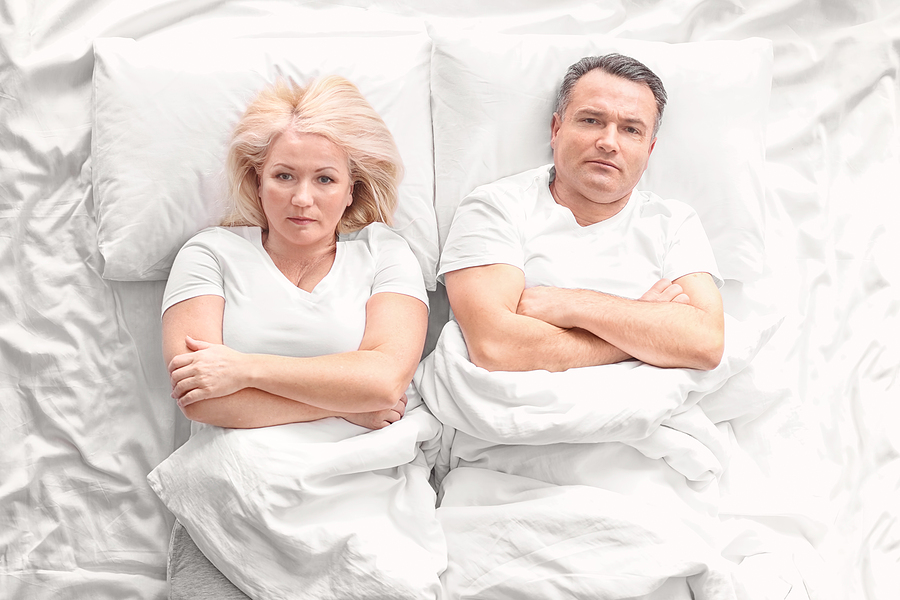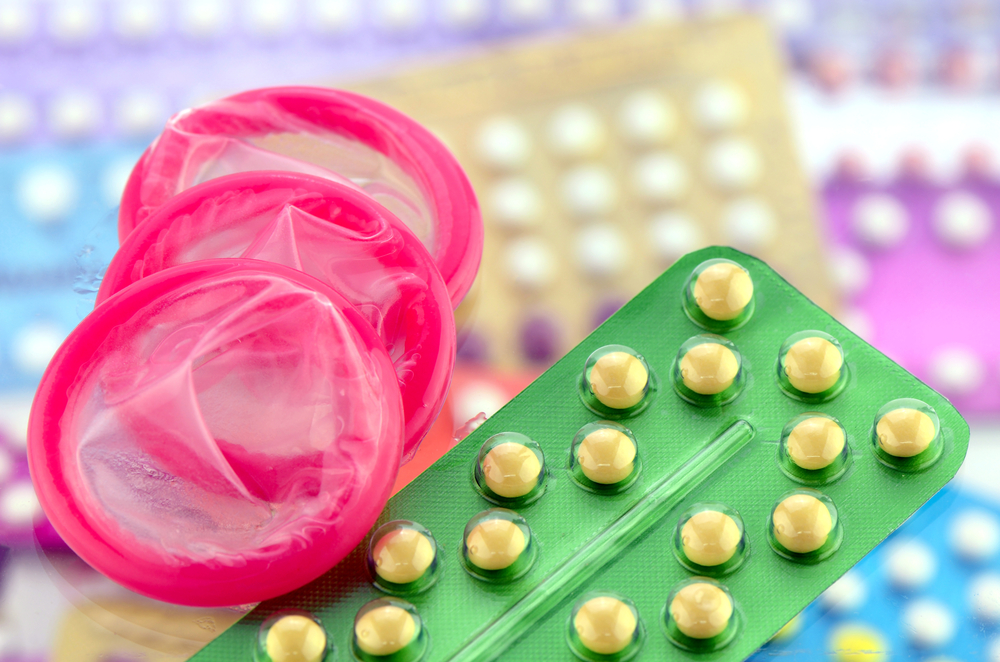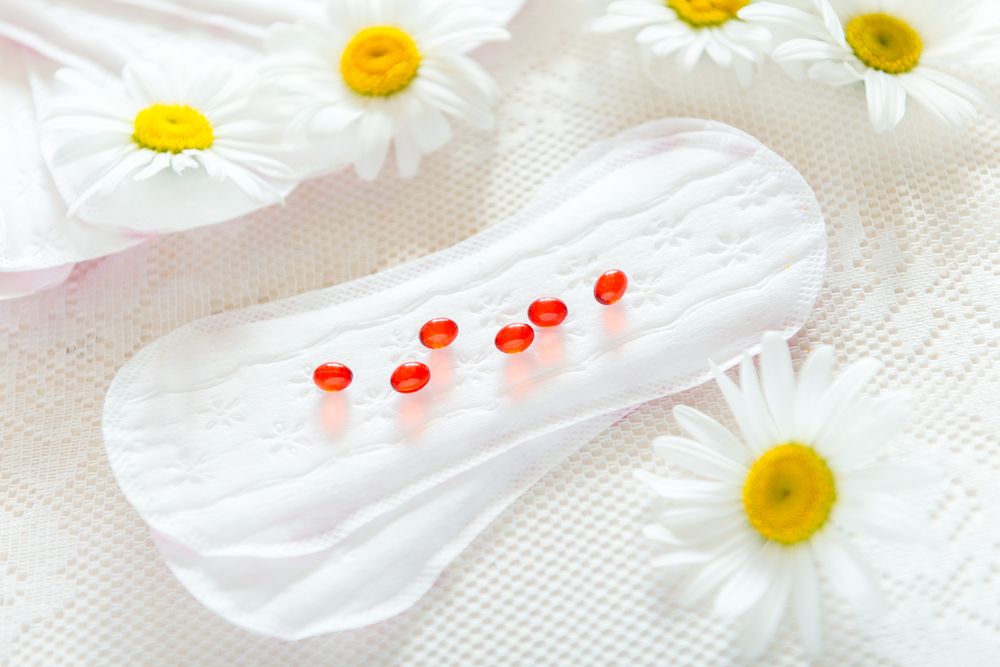Updated 11/18/2020
When Crystal told me her sex life was nearly non-existent, and had been for months, I could see her distress.
She’d come to see me about other symptoms that were cropping up as she experienced perimenopause, but this was the one that seemed to be her top concern. Her partner was frustrated, and honestly, so was Crystal.
She wanted to feel sexual desire again. She missed it!
Even more, she missed the intimacy that sexual activity brought to her relationship. But she just couldn’t feel the way she used to about it, she told me.
Worse, when she did force herself to try vaginal dryness and discomfort made it impossible for her to enjoy herself.
So many women find themselves facing these same challenges as they age. So much in a woman’s body (and life!) changes during the years of perimenopause and menopause; it makes sense that sexual experiences may be changing as well.
The transition to menopause, though empowering in many ways, doesn’t always come easily.
Hot flashes and mood swings may impact how they feel about sex, while weight gain may leave them feeling less sexy and uncomfortable about anyone seeing them naked.
And then there are the other changes happening, on top of all the physical shifts. Children are growing older and moving out, leaving an “empty nest” behind.
Or they are in the throes of their hormonally-charged teenage years. Older parents may be moving closer – or even into the same home! Women are approaching the height of their careers – both in performance and stress.
Relationships can become “settled” after many years together, which can shift how a woman view’s sex. Or unresolved relationship issues are suddenly entering into the bedroom for the first time.
Some women may be single again. Re-entering the dating world may lead them to revisit their sexual desires and values – or maybe even become overwhelmed and retreat!
Not surprisingly, all of this can lead us to a place where sex just isn’t top priority. But it shouldn’t just fall by the wayside.
I believe it’s important for you to define the role you want sex to play in your life, even as you realize that role may well change over time. If sex is on the back burner by choice right now, that’s totally ok.
But even if it’s less frequent, sex shouldn’t be any less enjoyable. And if you wish your sex life were more vibrant, it’s time to discover how to regain control over your sex drive.
A healthy sex life is an important part of who we are. Research shows staying active sexually can bring both physical and emotional benefits.
At MarcellePick.com, we want you to know that you deserve a satisfying sex life if you want one and that you CAN continue to have pleasurable sex at mid-life — and beyond. Just ask some of my patients in their sixties!
So, what’s happening in our bodies to cause low sex drive, and what can we do to maintain or restore the healthy sex life we desire? Let’s take a look.
Why Does Sex Drive Decline?
This is a question I get a lot; why does the desire for sex cease or decline as we get older?
With all the changes occurring in our bodies and our lives at this time – there’s a lot going on; it’s no wonder sexual activity often takes a back seat.
Sex drive is affected by our physicality and the changes occurring within our bodies as well as by emotional factors.
As with most things in our bodies, the physical and the emotional issues are interconnected and interdependent so we need to address both.
Let’s begin with the physical factors, as I know so many of my patients struggle there.
One of the most obvious triggers of lower sex drive is hormonal imbalance. In addition to common symptoms like insomnia, hot flashes, mood swings and weight gain that we see in perimenopause, sex drive is also affected by our changing estrogen, progesterone and testosterone levels.
Usually, once hormonal balance is restored, so is libido. Let’s look at the key hormonal players and how they impact your sex drive.
One of the most important drivers of libido is the hormone testosterone. Testosterone levels often drop in perimenopause, impacting sexual interest, arousal and response as well as lubrication and orgasms.
Our ovaries produce both testosterone and progesterone (a building block for other hormones including testosterone). But to do so they require cholesterol.
Because your brain and cells also need cholesterol (and take priority over sex hormones), adequate production may not be supported if you’re eating a low fat diet which lowers your cholesterol levels too much.
Testosterone can also be made through the conversion of DHEA, a hormone secreted by the adrenal glands. But if stress is present, then DHEA will be diverted into cortisol instead.
Both healthy eating and a low stress environment are required for optimal hormonal balance.
In my practice I often see that women who have better nutrition and more balanced adrenal function are able to maintain good testosterone levels through perimenopause.
Hysterectomy and Surgical Menopause
The role of ovaries in hormone production poses a big challenge to women who will reach menopause as a result of surgery or medical treatments that can result in a loss of normal ovarian function – and almost one in four women do!
When this happens, it’s quite likely that sexual issues will result since testosterone production is minimal – or even stops completely.
This is a certainty with a total hysterectomy, in which both the uterus and the ovaries are removed. It may also occur with a partial hysterectomy since even if you maintain your ovaries after surgery, ovarian circulation is compromised in more than half of these cases.
Since testosterone is so important for arousal, response, lubrication, and orgasm, low or no production of this hormone impacts the sexual experience of millions of women.
If you have your ovaries removed, or experience reduced ovarian function after surgery, working with an experienced practitioner to explore options like prescription testosterone is key. But don’t be fooled, as many women are, into thinking taking prescription testosterone is an easy and quick fix to increasing your sexual desire.
I never encourage jumping to prescriptions as the easy answer. Low testosterone is the symptom, not the main issue.
Addressing the underlying concern, whether physical or emotional, is always a better first step. Most of the time, low testosterone can be rectified with nutrition, supplements and stress management.
Vaginal dryness
Women often experience physical changes in their vagina as we age, which can cause low sex drive. After all, who wants to do something that hurts?
As estrogen levels decline during perimenopause, thinning, tightening and dryness may occur in the vagina and the vulva. In some cases, this can lead to discomfort – or even intense pain – during sex.
Vitamin E suppositories twice a week can make a huge difference for many women and water-based lubricants can help reduce friction during intercourse. Dietary changes, supplements, and in some cases, natural progesterone cream are usually helpful as well.
Any type of dryness – whether in the vagina, mouth or skin – is a sign that your mucous membranes are dry. Drinking plenty of water helps keep these areas moist from within.
In some cases, good nutrition, hydration and lubrication should do the trick. But sometimes, they just aren’t enough.
When this is the case, there are prescription estrogen products that can be applied topically to the vagina. Low dose estriol vaginal cream can be made by compounding pharmacies and does not carry the health risks of oral synthetic HRT.
We’ve had incredible results in our practice using a prescription testosterone, DHEA, and estriol product in these cases, so be sure to work with your practitioner to find the right solution for you. Don’t give up until you find it!
For more information on this topic, read our article, “Treatments For Vaginal Dryness“.
Other physical causes of low sex drive
Let’s explore diet and stress a little further before we dive into emotional reasons for reduced sexual desire.
Diet
Years of poor dietary choices and unhealthy attitudes or behaviors around food lead to nutritional deficiencies that create hormonal imbalances.
Your views on food and the role of dieting in your life shapes the way you feel about how you look (which impacts sexual desire). Constant consumption of sugar or processed foods leaves your body playing a continual game of nutritional catch up.
By the time women reach perimenopause, their bodies have been compensating for these imbalances for far too long.
The good news is that eating healthy combinations of vegetables; fats such as olive oil, coconut oil, butter and avocados; and proteins such as grass fed beef, bison, or wild Alaskan sockeye salmon, can help our bodies to heal.
Because food doesn’t have the same nutritional value it used to, both a high-quality multivitamin and a fatty acid supplement, such as those I offer in my shop, are virtually essential these days.
Stress
When your stress response is activated, everything but survival is put on hold. Constant stress prompts the constant release of cortisol, which means production of estrogen or testosterone, which drive desire and sexual response, declines.
Stress is inevitable. But if you feel like it’s ever-present, it’s time to look for ways to cope with and release this stress before it wreaks havoc on your adrenal system.
(If you are under constant stress, you’ll want to consider adrenal support such as our Feeling Tired Adrenal Program or Feeling Wired Adrenal Program, depending on your situation.) Click here to take our Adrenal Health Quiz to gauge where you are.
You can’t control all sources of stress, so focus on those that you can.
Are there ways to manage these stressors better? Can you find healthier ways to react to stress when it does occur?
If most of your stress seems outside of your control, I encourage you to dig deeper. What can you let go of? What small steps can you take to manage the stress?
A little self-nurturing can go a long way.
Make time for a candlelit bath. Reach out for support from someone who will simply listen so you can vent and release. Look to creative pursuits such as painting, journaling, singing, meditating, yoga or tai chi to release tension and express yourself.
Whatever you choose, the practice needs to engage you fully, fit into your life and bring you peace and joy.
Emotional causes of low sex drive
The brain is the biggest and most important sexual organ. What we think about sex, and how we feel about ourselves and our partner plays a huge role in our sexual experience. Many women tell me that the emotional aspects are as – sometimes even more – important than the physical.
I find it fascinating that women are the only species and gender that is sexually aroused by our own pheromones. In other words, for women to feel sexual desire, we have to feel sexy.
As bodies change in perimenopause our feelings about how attractive we are often do as well. We can thank the media’s worship of youth and unrealistic portrayal of beauty for that.
Some women connect sex with reproduction and feel that sex in the post-pregnancy years may seem inappropriate or even shameful. Others have been willing to let their partners drive the sexual process for so long that now they are unwilling or unable to be assertive and ask for their own sexual satisfaction.
Relationship dynamics often play out in the bedroom. Issues of control, respect, consideration, and communication, along with your problem-solving abilities and styles, can impact intimacy and trust. Without intimacy and trust, sustaining sexual desire is a challenge.
Many women are surprised that dynamics that have been present for years suddenly bother them. Menopause is a time for women to find their voice and reach clarity on who they are and what they want. It’s no surprise that part of that process involves our intimate relationships and sexual experiences.
If your relationship is struggling, in or out of the bedroom, now is the time to begin working through your unresolved issues. If you and your partner need help, find a relationship or sexual therapist to guide you.
Don’t assume that these issues will go away. Menopause has a way of bringing issues to the surface and if you don’t address them, your body will face them sooner or later.
Guilt, shame or trauma around a previous sexual experience must be dealt with.
It’s estimated that one in three women experiences some kind of sexual trauma during their lives. It’s not their fault – and if it happened to you, it’s not your fault.
There’s no need for guilt or shame. Seeking professional help can have benefits far beyond your sex life.
Staking Your Sexual Claim
Sexuality and sex drive aren’t constants throughout our lives.
What feels right and good to us in our twenties will morph as we settle down and raise families and then will shift again as we transition through menopause and find our true selves again, or perhaps for the first time!
Menopause is a great time to reflect on who we are and what we want, in all aspects of our lives, including our sex lives. It’s also a time to grow and explore and try new things.
Don’t be afraid to talk about what you might want with your partner. A sexy movie, a juicy book, a candlelit bath, or a trip to sex boutique may be just the ticket to rekindling your desire.
Your journey is uniquely yours, and it is your right to express your sexuality as you please and choose what is right and best for you. Discovering what might be getting in your way is an important first step.
In addition to specific products to target your physical concerns that you can discuss with your practitioner, our Menopause Program or our Feeling Tired Adrenal Program or Feeling Wired Adrenal Program can go a long way to laying the nutritional foundation required for restoring hormonal balance and increasing your pleasure and desire, now and in the years to come!







